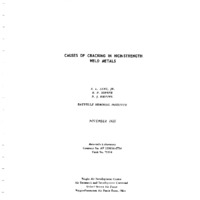Causes Of Cracking In High-Strength Weld Metals
Item
-
Title
-
Causes Of Cracking In High-Strength Weld Metals
-
Date
-
1952
-
Index Abstract
-
Coming Soon
-
Photo Quality
-
Complete
-
Report Number
-
WADC TR 52-322 Part 4
-
Creator
-
Lowe, A. L., Jr.
-
Rieppel, P. J.
-
Sopher, R. P.
-
Corporate Author
-
Battelle Memorial Institute
-
Laboratory
-
Materials Laboratory
-
Extent
-
41
-
PB Number
-
PB124150
-
Identifier
-
AD0093335
-
Access Rights
-
None
-
Distribution Classification
-
1
-
Contract
-
AF 33(616)-2734
-
DoD Task
-
73516
-
DTIC Record Exists
-
Yes
-
Distribution Change Authority Correspondence
-
PER ASD LTR
-
Abstract
-
This report summarizes the experimental work in a study to determine the causes of cracking in high-strength weld metals. A new hot-tension machine was designed and built to facilitate the testing of SAE 4340 weld metals on cooling from the molten state. The tests were conducted over the temperature range from 2600 F to 100 F. Results from the studies showed phosphorus to be detrimental to weld-metal cracking resistance. As the phosphorus was increased the ductility was lowered at temperatures near the solidus. Nitrogen content within the normal range of SAE 4340 steels appeared to have little influence on the cracking resistance of the weld deposits. Rare-earth metal additions improved the hot ductility and hot-cracking resistance of the weld metals. An increase in silicon lowered the hot ductility and hot-cracking resistance slightly.
-
Report Availability
-
Full text available
-
DoD Project
-
7351 - Metallic Materials
-
Date Issued
-
1955-11
-
Provenance
-
IIT
-
Type
-
report
-
Format
-
1 online resource
 WADCTR52-322part04.pdf
WADCTR52-322part04.pdf